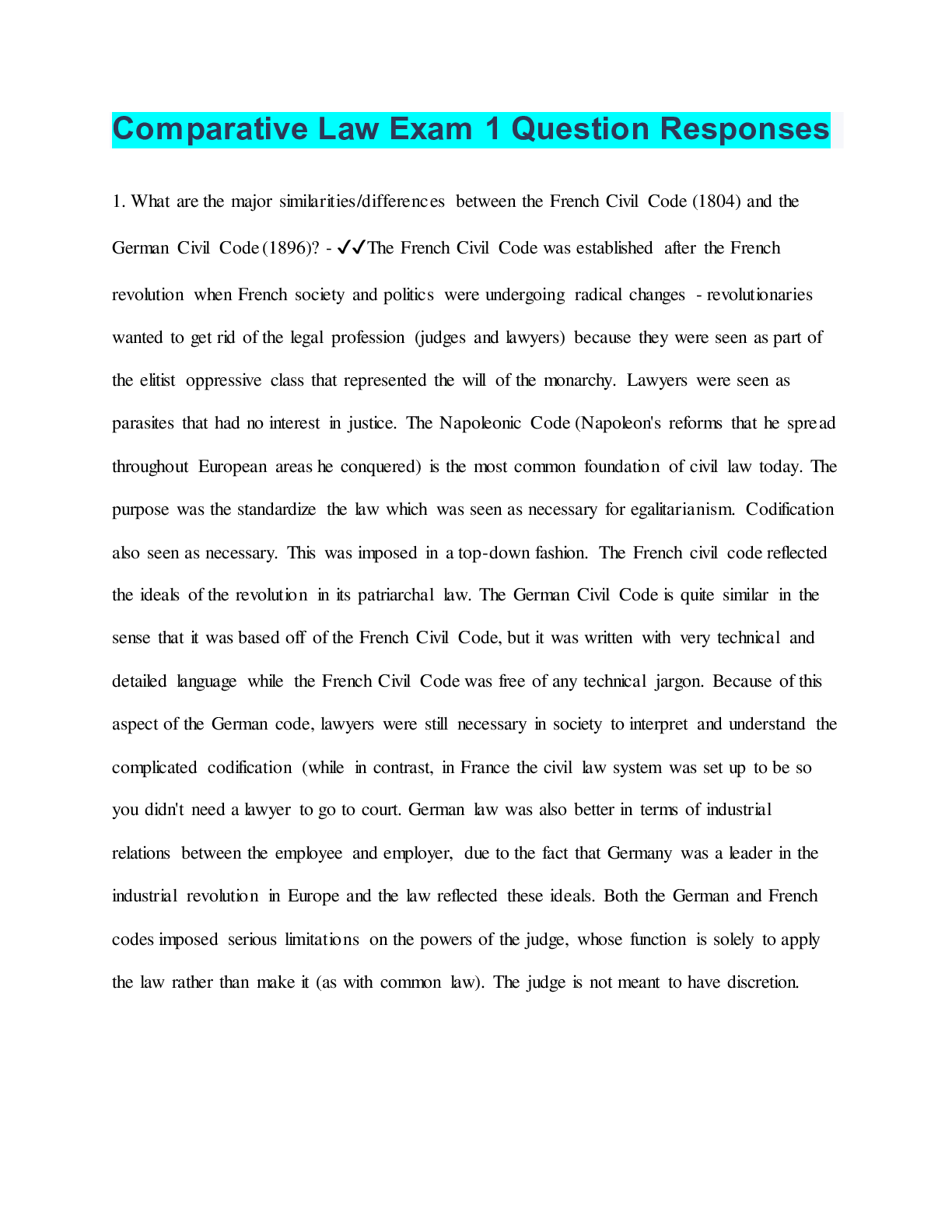Law > QUESTIONS & ANSWERS > Comparative Law Exam 1 Question Responses (All)
Comparative Law Exam 1 Question Responses
Document Content and Description Below
Comparative Law Exam 1 Question Responses 1. What are the major similarities/differences between the French Civil Code (1804) and the German Civil Code (1896)? - ✔✔The French Civil Code was esta... blished after the French revolution when French society and politics were undergoing radical changes - revolutionaries wanted to get rid of the legal profession (judges and lawyers) because they were seen as part of the elitist oppressive class that represented the will of the monarchy. Lawyers were seen as parasites that had no interest in justice. The Napoleonic Code (Napoleon's reforms that he spread throughout European areas he conquered) is the most common foundation of civil law today. The purpose was the standardize the law which was seen as necessary for egalitarianism. Codification also seen as necessary. This was imposed in a top-down fashion. The French civil code reflected the ideals of the revolution in its patriarchal law. The German Civil Code is quite similar in the sense that it was based off of the French Civil Code, but it was written with very technical and detailed language while the French Civil Code was free of any technical jargon. Because of this aspect of the German code, lawyers were still necessary in society to interpret and understand the complicated codification (while in contrast, in France the civil law system was set up to be so you didn't need a lawyer to go to court. German law was also better in terms of industrial relations between the employee and employer, due to the fact that Germany was a leader in the industrial revolution in Europe and the law reflected these ideals. Both the German and French codes imposed serious limitations on the powers of the judge, whose function is solely to apply the law rather than make it (as with common law). The judge is not meant to have discretion. Can civil law judges interpret statutes? - ✔✔No. Civil law judges cannot interpret statutes for the most part. A judges powers in a civil law system are relegated to applying the law but not interpreting or making it, as laws are made only by the legislative branch and are expressly codified so there is little reason for interpretation. There is no precedent or stare decisis in civil law, so there is no way for the decisions of past courts or judges to have much relevance on future cases and therefore doesn't create new law. In civil law system there is a strong distrust of judges as a profession (due to the values of the French revolution and fear of elitism and the monarchy) and therefore severely limits the discretion of judges in the civil law system. How would you compare the function and role of civil law and common law judges? - ✔✔In common law there is less codification and judges have significantly more discretion than do civil law judges - they have the ability to interpret the law and also make it. Common law judges rely on precedent/ stare decisis which is not a feature of the civil law system. In common law, codification exists to complement and clarify the existing law, not to be the sole law. In civil law, codification is there to replace the existing law and therefore not have any need for judges to interpret. In civil law systems, judges are just public servants of little notoriety that applies legislation. Common law judges can be very powerful and have a lot of notoriety (think of how SCOTUS creates new lew through their politically salient and highly public decisions) and enough discretion to make new law and precedent. What is a court? How would participation of lay individuals (as magistrates, judges or in another capacity) alter our understanding of "court" as a dispute resolution mechanism? - ✔✔In a common law system, a court is defined by having independent judges, pre-existing law, adversarial proceedings, and an end result in which one party is declared right and the other declared wrong. Judges are impartial but not independent of the state. Pre-existing law must be there for courts to exist, certain and predictable, and accessible to people. Adversarial proceedings mean there is a dichotomous solution, and a winner and loser within the system. NOTE - in civil courts/European courts, proceedings are NOT adversarial but inquisitorial, which just means that the parties are not allowed to engage with each other or question each other directly and must go through a judge. Courts are only adversarial in the common law context. The court is the main institution of law enforcement in the modern nation state. The participation of lay individuals alter our understanding of "court" as a dispute resolution mechanism because they tend to be doing the decision making in cases of mediation (not arbitration or adjudication), which means that people that aren't necessarily legally trained or have formal legal expertise are exercising discretion wi [Show More]
Last updated: 8 months ago
Preview 1 out of 19 pages

Reviews( 0 )
Document information
Connected school, study & course
About the document
Uploaded On
Aug 21, 2023
Number of pages
19
Written in
Additional information
This document has been written for:
Uploaded
Aug 21, 2023
Downloads
0
Views
55

.png)
.png)
.png)
.png)
.png)
.png)
.png)
.png)
.png)
.png)
.png)

.png)

.png)
.png)




















